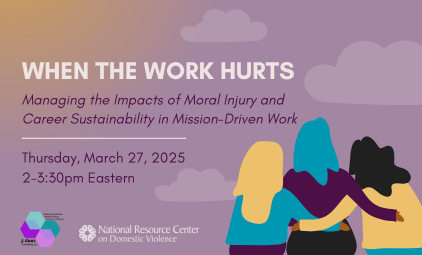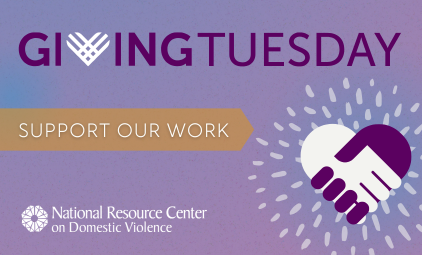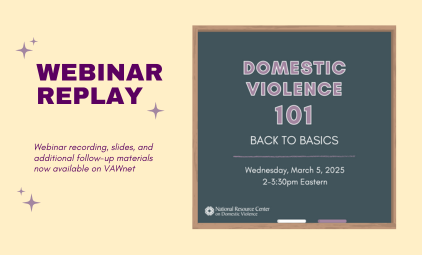“When you think, ‘Oh, there’s all these people who are already doing it,’ ‘There’s no reason for me to do it,’ or ‘I don’t have anything different to say,’… there’s always room for you.” – Olga Trujillo
The narratives of adult children exposed to domestic violence (ACE-DV) inspire us to explore assets and strengths, shift from deficit to growth, and promote healing and resilience. Their stories bring critical perspectives to the complexity of survivors’ choices, the humanity of those who use violence, the power of a loving community, the ways in which our trauma experiences shape us, and the possibility of accountability and change.
However, input gathered from ACE-DV-identified advocates in the movement to end domestic violence revealed that they do not feel supported in bringing their multiple identities to their work. When aspiring storytellers who participated in our Speakers Bureau inventory and needs assessment were asked where support was needed to increase their storytelling capacity, they asked for validation “that my story is worth telling and being heard, and that it is instrumental for the work of the movement” (Survey Participant, 2018). Survivors feel pressured to choose between their advocate and survivor identities, and to make the case for the value of their personal experiences within our own movement. Furthermore, the stories of Black-identified survivors have been devalued and historically left out of narratives about surviving and thriving after childhood trauma.
The Adult Children Exposed to Domestic Violence (ACE-DV) project offers a unique space to amplify the voices and experiences of those who identify as ACE-DV, driven by their purpose, To Center Humanity as Healing. The ACE-DV Speakers Initiative is an important component of this project, valuing the perspectives that our layered identities and complex experiences bring, and encouraging and supporting survivors of trauma and oppression in bringing their whole selves to this work.
This Toolkit offers a variety of practical resources and tools to help build the capacity of adult survivors of children’s exposure to impact change through storytelling. Materials are accessible in a variety of formats to suit the diverse learning styles of this audience.
Speaker’s Guide
From the Front of the Room: Sharing Your Childhood Story of Domestic Violence (December 2017)
This guide, designed for adult survivors, explores the power of storytelling and the unique value that stories of adult children exposed to domestic violence can bring to social change movements, offering guidance for 1) assessing readiness, 2) finding your voice, 3) clarifying your message, and 4) attending to your wellness. Considerations for speaking to key audiences are also included.
Download the Pocket Guide.
Webinar 1
Storytelling for Social Change: Sharing Your Childhood Story of Domestic Violence (December 2017)
Featuring ACE-DV Leadership Forum members James Henderson, Zulema (Ruby) White Starr, and Olga Trujillo
On this webinar, presenters reflect on their own experiences as seasoned storytellers within the context of their movement work, offering practical tips and strategies for building capacity to bring voice to the unique experiences of adult children exposed to domestic violence.
“I really appreciated the story telling and could relate so much to what was said. It is good to have people open up and be brave. I was able to reframe some of my thinking and language after listening to them.” – ACE-DV webinar participant
Webinar 2
Valuing Your Story (September 2018)
Featuring ACE-DV Leadership Forum members Rebecca Balog, Lenny Hayes, William Kellibrew, and Annika Leonard
In this panel discussion, guests explore considerations for valuing your worth as a speaker, making the case to our agencies/systems, negotiating contract terms and fees, retaining rights to your story, and the risks and challenges in speaking your truth, especially for those who experience multiple layers of oppression.
Webinar 3
Navigating Challenges in Storytelling with Audiences (December 2018)
Featuring ACE-DV Leadership Forum members Rebecca Balog, James Henderson, Zulema (Ruby) White Starr, and Olga Trujillo
In this panel discussion, guests strategize together about common audience-generated challenges when sharing our stories in public spaces.
Webinar 4
Not One Path: Speaking to Our Relationships with Those Who Abuse (January 2019)
Featuring ACE-DV Leadership Forum members David Adams, Lenny Hayes, Ericka Kimball, and Shenna Morris
This panel discussion addresses the challenges and opportunities in naming our complex relationships with those who have caused harm to us and/or our childhood caregivers.
“It’s a lot of hard work; it’s not easy. But I would definitely tell people not to give up, and to keep coming forward and telling your stories because… all of this work really begins with the survivors.” – Lenny Hayes
| Attachment | Size |
|---|---|
| Tip Sheet 1: Sharing Your Childhood Story of Domestic Violence | 455.16 KB |
| Tip Sheet 2: Valuing Your Story | 332.88 KB |
| Tip Sheet 3: Navigating Challenges in Storytelling with Audiences | 350.13 KB |
| Tip Sheet 4: Not One Path: Relationships with Those Who Cause Harm | 509.05 KB |














